
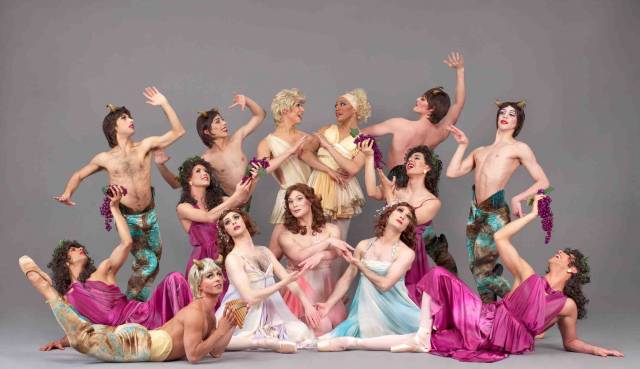
Les Ballets Trockadero de Monte Carlo is not your typical ballet company. Picture a corps de ballet of all men in pointe shoes, essentially in drag. They are men of all shape, size, color, and background. It’s fun; it’s comedy! But, it’s also much, much more than that.
I got a chance to speak with two members of the internationally acclaimed ballet company to find out what’s beneath all the humor, make up, fake eyelashes and gigantic pointe shoes. Along the way, I found some beautiful, inspiring, and humorous answers. Raffaele Morra has danced with the company for thirteen years, Carlos Renedo for three. Having different experiences, they both have shared some key elements as to why this company has made audiences laugh for forty years!
How long have you been dancing and how long have you danced for the Trocks?
Raffaele Morra: This year is my twentieth anniversary as a professional ballet dancer and performer. And, I joined the Trocks in 2001. So now I’ve already been 13 years dancing with the company and now I’m going to start my 14th.
That is a long time to be with one company.
Raffaele: Yeah, it is a long time, yes. But, you know, I loved it from the beginning and I still love it. So why should I leave it?
(laughter)
That’s right! How about you, Carlos?
Carlos Renedo: I was born and raised in Barcelona, Spain. I started dancing, actually pretty late, but I was 17 and I started with like jazz and tap dancing and contemporary cause I wanted to be like a musical theater performer, and actually that’s what I started doing in Spain professionally. I grew up also wanting to be an actor, so I was always training and taking acting classes, magic, guitar… I’m always wanting to learn more and want to do a little bit of everything. I performed in musicals for three years in Spain and then I moved to New York City in 2008 and I started taking classes. So, it was at the beginning of 2011 when I saw Trockadero was holding auditions. I’d trained on pointe a little bit before just for fun, but when I saw that Trockodero was holding auditions I decided to like, prepare myself for the audition. Everything went really fast. I went into the audition; I got a yes. The day after, I started rehearsing and in one week I moved to New York City. So now, I’ve been in the company for three years and at the beginning of the year I’m going to start my fourth contract.
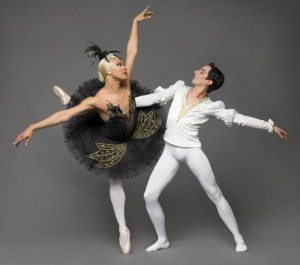
So, Raffaele, how did you get into the company?
Raffaele: I was reaching a point in my career when I was in Italy and I was ready to move on. I said, okay, I need something new. I need new experiences. On the other hand, I said, if I need to leave Italy, I want to go somewhere where it’s interesting to go. I don’t want to go to another company that does the same thing. I looked around and there was a lot of opportunities but nothing was really appealing. What happened was: Trockadero came to perform in Torino for a Balanchine festival. I went to the performances but I also had the opportunity to see the press conference. I was very lucky that I had the opportunity to hear the director speaking about the company and what the company was about. They showed a documentary that was made years ago about the company, and I said, now this is really interesting. This is something worth moving from Italy with suitcases and fly across the ocean and get to New York to work with this. They had everything I always wanted in a performance. There was a classical ballet repertoire, which I always loved even though I was a modern dancer in Italy. I’ve always loved the Classical Ballet. I always loved Swan Lakes and Nutcrackers… So I’m kind of a nerd in that way.
(laughter)
Raffaele: For real! And then there was the comedy aspect of it, which of course I love. Who doesn’t like to laugh? I always loved to laugh. It was funny, but it was interesting, well done, and a nice approach to classical ballet. It was not mocking classical ballet; it was almost an homage to the ballet. What really made me understand that I wanted to do that was the reaction of the audience, and I was a member of the audience as well. I remember having so much fun. Everybody around me was having so much fun! Even leaving the theater, they were remembering what happened on stage with smiles on their faces. They said, “I can’t wait for them to come back because I really want to go see them again.” I mean, this is something that you want to hear from the audience when you are a performer! I was pretty sure that all the dancers were also having a lot of fun during the show. And I wasn’t wrong because now, after 15 years, I can still tell you: every time I go on stage, I still have a lot of fun. And the reaction of and interaction with the audience, which is immediate, is really fulfilling.
It looks like a blast! You can tell that everyone is having so much fun, which makes me curious about the rehearsal process too…
Raffaele: Usually people ask, “Do you also have fun during the rehearsals?”
Right.
Raffaele: Well, we do because we… I don’t know… Have you ever watched the outtakes from the rehearsals of a series where you see the actors also having a wonderful time because if you want to do something funny, you also think that it’s funny. But, just like in those series, we take our work very seriously. So, it’s also very hard. We work 6, 7, 8 hours every day. It’s a hard job. So, of course we have a lot of fun, but it is a hard job. It’s not that we just have fun and we act silly because what we do is funny and entertaining. No. We work hard. We first have to learn all the ballets the way they are and then make it Trockadero style.
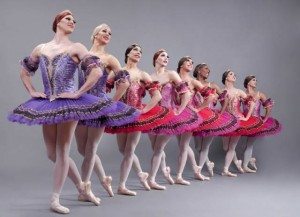
You can see in the dancers and in the dances the amount of discipline. It makes you respect what is happening on stage. It’s more than funny.
Raffaele: Oh, yes. There is a lot of discipline.
Carlos: It would be very easy to fall into making it just easy and cheesy as well. Some companies try to do something like what Trockadero does and are maybe not as successful because it is a lot of work.
Raffaele: What else I think is very interesting: if we have to do a Russian style ballet, we try to work with Russian teachers. If we want to do something inspired by Balanchine, we try to work with someone who worked with Balanchine... to get the style. In our versions of these works, we want to be as loyal as we can and then make the parody. So it’s discipline... and it’s almost like research.
Carlos: It’s a perfect balance between the technique and the humor. It’s not like ridiculous humor. It’s like very intelligent humor. We travel around the world and we get the best reaction from all different cultures. I always say, laugher is international, you know? It’s beautiful to see how every audience reacts differently, but the result is always the same. It’s a positive result. It reaches all different audiences whether you know a lot about ballet or you’ve never seen one. It’s actually a very good show to introduce people to ballet. It’s not like a long three hour ballet that can sometimes be a little boring if you’re new to it.
I’ve brought friends to the ballet before and have looked over and they’re dozing off a little bit. (laughter) It’s just not everyone’s thing sometimes, especially classical art, in general.
Carlos: Exactly.
Raffaele, how do you think the company reaches a broader audience?
Raffaele: Actually, a few days ago I received a message from a friend of mine that came to see the show in San Antonio, and he came with his nephew. His nephew has never talked, never heard about ballet. He was not interested. But, he came to the show and then the next day he was researching on Wikipedia Swan Lake. He was starting to learn what ballet is and was starting to be interested. I think it’s because our performance is so light and entertaining. It is a very good introduction to classical ballet, not only for people that don’t like classical ballet, but also for people that have never seen ballet... and also for kids. They can follow the story; it is quite entertaining; it is colorful; it is a wonderful introduction for everyone. In general, our performances are so happy and, of course, people get more interested and think: well, maybe it’s not that bad to go see the real ballet.
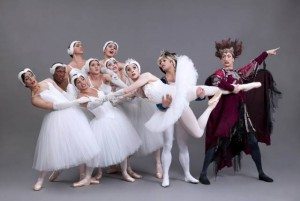
I feel that there are very few people who can get away with doing what you’re doing, which is making fun of… respectfully making fun of a classical art form. What makes this company able to do this so successfully after so many years in existence?
Raffaele: For anything to be successful, and to last for a long time, it must keep up to date. We have kept our original idea for forty years, but if you see the company in video tapes from forty years ago and see the company now, you see how much it has changed. When the company was created in 1974, it was mostly comic performance. The dancers weren’t really professional dancers, or if they were they weren’t highly skilled professional dancers. I don’t want to offend anyone, but it was mostly comedians.
Of course. I don’t think that’s offensive. They were just different types of performers than the company members now.
Raffaele: The company wasn’t performing in big theaters and was not acclaimed as a professional ballet company. Right now, after forty years, we have performed at the Bolshoi Theater in Moscow, the Kennedy Center in Washington, and many others because we are a ballet company that makes fun of classical ballet.
Carlos: These days a lot of men come to auditions more prepared to do pointe work. Years ago, Trockadero was more about the acting. Now, they come with better technique on pointe, with tricks…
Raffaele: The level of the company has changed, which also means that the kind of jokes has changed. What made sense forty years ago doesn’t make sense now because the people are different. So, we cannot make the same kind of jokes. We have to evolve. We have to evolve constantly. And the only way to evolve is to look around to see what people think and what people like. Just like when you watch a TV series now and watch one fifty years ago. They are different kinds of comedies. And that is what we have to do. We have to keep up with society and see what people like, what people laugh at, and, of course, we have to give the best ballet performance that we can. That is what I think is the success of this company.
Carlos, you’re getting ready to start your fourth year. What excites you about your future with the company? Do you plan on sticking around for a long time like Raffaele?
Carlos: I always wanted to join this company, especially for the acting part of it—for all the acting and humor because I always wanted to be an actor. When I first joined, I saw how hard it was, and I don’t know about other people, but for me it took a very long time and serious work to get used to it. Now, I’ve gotten to a point where I love what I do and I take it so serious that I’m improving. I’m turning thirty next month and… we’re getting older…
(laughter)
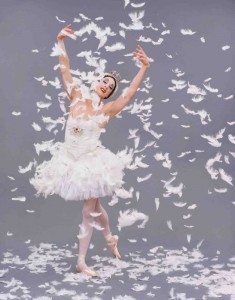
I understand!
Carlos: And I had like ten years of background in other kinds of dance, like contemporary and musical theater, which are completely different worlds from a ballet company. When I started doing this—pure ballet, one hundred percent—it took me a while to get used to it. But, now I’m loving what I’m doing, and I’ve been given great opportunities with the company. Slowly, by working hard and doing consistent work, I started getting solo roles and better roles until I also got the Dying Swan role, for example, which is more like a principal role. I’m very grateful. I feel like I have a long way to go still. And every day I try to do something a little better. That’s what’s keeping me alive in the company. That’s also what the director sees: that I’m interested in what I’m doing and take my work very seriously. That’s what makes me want to keep going. I don’t know for how long… I’ve never really been one to look into the future. I really live in the moment.
One step at a time, yeah?
Carlos: Yes, right now I’m just focusing on the here. But, I guess I’ll keep going until my body… or my head decides to…
(laughter)
Carlos: You know.
The company is known for doing much charitable work--performing at benefit shows around the world. Can you shed some light on this aspect of the company?
Raffaele: We are trying all the time to do our best to be a part of everything we believe in. We are always trying to be a part of anything that’s happening around us. We even participated in the ice bucket challenge, in our own way. We believe that our support can help the things we believe in—in any charity.
I really appreciate that. There is just a tremendous amount of positivity that comes from this company.
Raffaele: Absolutely. It is also what is keeping the company human. Every performer sometimes tends to be seen as being not human. When we are in the theater, our director is always reminding us to be very friendly because we want to be seen as human beings. You don’t want the audience to look at you and say “Oh, The Artist!” We are all together. We are all human and it’s a very nice approach to the show. That’s why (and this is like a joke going on about the artist) our director is always saying: keep the diva attitude for the stage, but never off stage.
Right! Some people don’t get that.
Raffaele: Well… within our company, we do. We are always traveling. We are always together. We are like a big, big family. We have to be friendly and we have to be nice to each other. We always have to keep a normal, human relationship with everyone else. The diva is for the stage.
Do you have any final words for us?
Raffaele: The only thing I would really like to address is that it is a wonderful performance for everyone. It is a wonderful night at the ballet. And, of course, for people who have seen us perform already, we have new ballets in both of our programs at the Joyce. So it is another wonderful night to spend at the ballet with the Les Ballet Trockadero de Monte Carlo.
Les Ballets Trockadero de Monte Carlo perform at the Joyce December 16 through January 4.